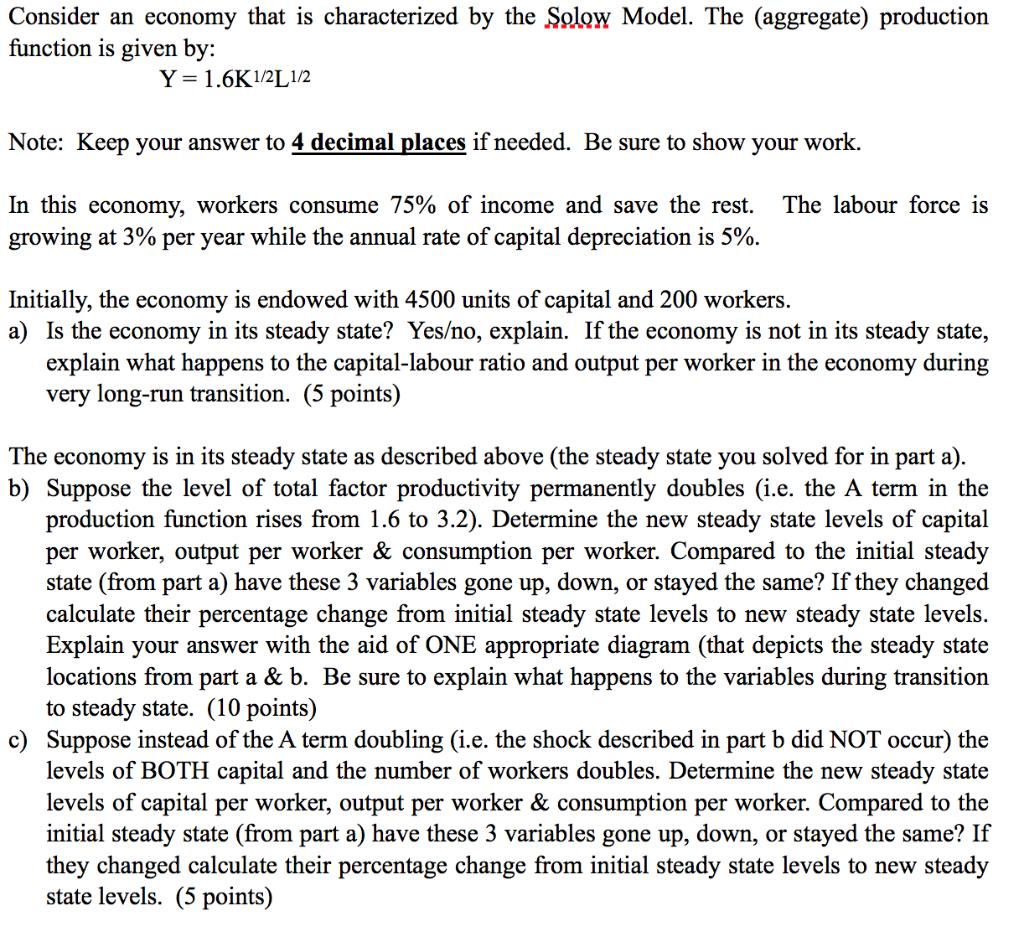Answered step by step
Verified Expert Solution
Question
1 Approved Answer
Consider an economy that is characterized by the Solow Model. The (aggregate) production function is given by: Y = 1.6K1/2L1/2 Note: Keep your answer

Consider an economy that is characterized by the Solow Model. The (aggregate) production function is given by: Y = 1.6K1/2L1/2 Note: Keep your answer to 4 decimal places if needed. Be sure to show your work. In this economy, workers consume 75% of income and save the rest. The labour force is growing at 3% per year while the annual rate of capital depreciation is 5%. Initially, the economy is endowed with 4500 units of capital and 200 workers. a) Is the economy in its steady state? Yes/no, explain. If the economy is not in its steady state, explain what happens to the capital-labour ratio and output per worker in the economy during very long-run transition. (5 points) The economy is in its steady state as described above (the steady state you solved for in part a). b) Suppose the level of total factor productivity permanently doubles (i.e. the A term in the production function rises from 1.6 to 3.2). Determine the new steady state levels of capital per worker, output per worker & consumption per worker. Compared to the initial steady state (from part a) have these 3 variables gone up, down, or stayed the same? If they changed calculate their percentage change from initial steady state levels to new steady state levels. Explain your answer with the aid of ONE appropriate diagram (that depicts the steady state locations from part a & b. Be sure to explain what happens to the variables during transition to steady state. (10 points) c) Suppose instead of the A term doubling (i.e. the shock described in part b did NOT occur) the levels of BOTH capital and the number of workers doubles. Determine the new steady state levels of capital per worker, output per worker & consumption per worker. Compared to the initial steady state (from part a) have these 3 variables gone up, down, or stayed the same? If they changed calculate their percentage change from initial steady state levels to new steady state levels. (5 points)
Step by Step Solution
★★★★★
3.49 Rating (162 Votes )
There are 3 Steps involved in it
Step: 1
ia the Production Digvoa YL 6 K Y 6R13 STAV OT pliga 07 prof otrgn k capital at the steady state prib nok oder tud 920 for at tomt xingy is eloittede ...
Get Instant Access to Expert-Tailored Solutions
See step-by-step solutions with expert insights and AI powered tools for academic success
Step: 2

Step: 3

Ace Your Homework with AI
Get the answers you need in no time with our AI-driven, step-by-step assistance
Get Started


